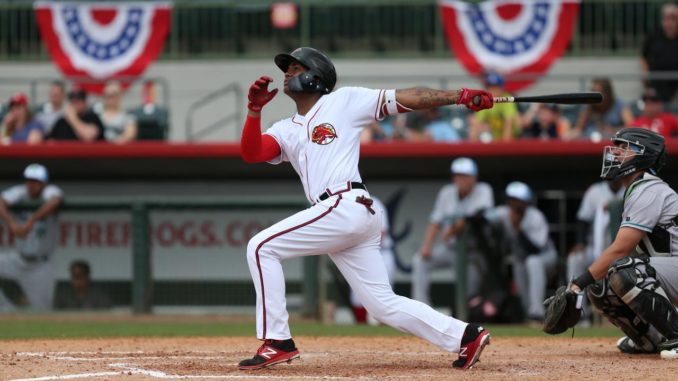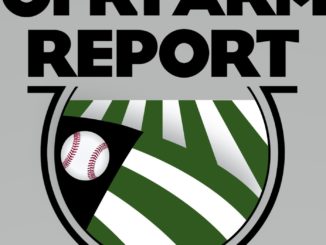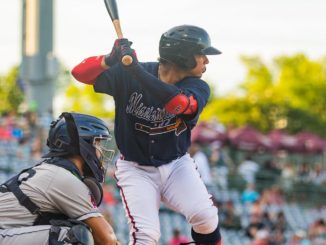
Despite an enviable roster of high-upside young talent and former Mississippi Braves manager Luis Salazar taking over the reins of the club, the 2018 Florida Fire Frogs ended up with the second last-place finish in the Florida State League in it’s two years of existence.
It doesn’t take an advanced analytical background to determine why. The Frogs finished last in the league in team OPS, 9th out of 12 in team ERA, and 7th in unearned runs. But other than hitting, pitching, and playing defense it wasn’t so bad.
So what happened? In some ways, it’s the same thing that happens every year with the Braves advanced-A teams. The Braves advanced-A clubs over the last ten years have had only 2 winnings seasons. This may have to do with the organizational philosophy of the club. The Braves have long considered Rome an important incubator, and have seldom pushed high-ceiling, very young players out of Rome before completing a full season.
The AA level is where the true prospects start to get polished for major league duty. So what of the level in between? At the beginning of the year, it tends to be primarily players drafted from the college ranks, fill-ins, and a couple prospects that need to get a bigger challenge than Rome but aren’t quite ready for AA. That can make for some uneven teams.
When the Fire Frogs opened the season, it boasted three of the top pitching prospects in the FSL in their rotation with Ian Anderson, Joey Wentz, and Bryse Wilson. It also inherited from the 2017 Rome squad a solid bullpen and interesting starters Tucker Davidson and Jeremy Walker, both of whom finished strong in Rome. The Rome offense in 2017 was fairly poor, but the Fire Frogs would have two legitimate position player prospects in Cristian Pache and Brett Cumberland.
So what happened? Low pitch counts for the starters early on exposed the bullpen and the offense could not score enough to overcome. Bryse Wilson started out of the gate amazingly well, but he was promoted to Mississippi after a month. Joey Wentz started to miss weeks at a time with mechanical and injury problems. Eventually the rotation and the bullpen would stabilize, but the offense never got off the mat, and by August almost the entire line-up had been turned over, with Pache, shortstop Ray-Patrick Didder, second baseman Alejandro Salazar, and starters Anderson and Kyle Muller promoted and Cumberland traded. The replacements from Rome in August had some success, but by then it was too late to save the season.
Infield
Former 2014 1st-round pick Braxton Davidson made the move from right field to first base for the Fire Frogs and held down the position all season. This was Davidson’s third consecutive season that started and finished at the advanced-A level. The good news is that the raw power that scouts always saw in Davidson finally manifested, and his 20 home runs lead all Braves minor league affiliated ball and was second in the FSL. The bad news is that to sell out for power, Davidson’s already prominent swing-and-miss tenancies exploded. His 44.3% strikeout rate was the highest of his career and his 213 strikeouts shattered the Florida State League record.
Second base was manned by a hodgepodge of role players. Former South Carolina standout Marcus Mooney got the bulk of the playing time at second thanks to his plus defense at the position, but his .214/.302/.242 batting line often had manager Salazar casting about for another option. For the first half, that was often Alejandro Salazar, who was moved off his customary shortstop position and switched between second and third. While possessing nearly no power, Salazar has been proficient at making contact and more often found holes. After Salazar was promoted to Mississippi, Kevin Josephina was used to inject speed into the line-up, but a .271 OBP negated his effectiveness. In short, the second base position was largely unproductive all season.
At shortstop, Florida employed Ray-Patrick Didder nearly exclusively for the first two-thirds of the season. While Didder had played some infield in 2017, he had mostly been an outfielder for most of his minor league career but the Braves placed him at shortstop this season and did not budge him. While somewhat mechanical at the position early on, Didder adapted over the course of the season and by the time of his promotion to Mississippi he was making the routine plays and plenty of non-routine plays. At the plate, Didder appeared to be trying to shorten the length of his swing, but results didn’t manifest until he moved to Mississippi. After Didder was moved up, the Fire Frogs handed shortstop to the reliable Riley Delgado, up from Rome. Delgado hit .288/.340/.316 in his six weeks with the club, mostly hitting out of the #2 spot.
Third base was similar to second base for much of the year, with 2017 senior-sign Jordan Rodgers handling the position the majority of the time over the first two-thirds of the season. While a capable defender, Rodgers only hit .219/.268/.329 this season and was substituted often by Salazar and utility infielder Kurt Hoekstra. The final four weeks of the season saw 2018 20th-rounder CJ Alexander bumped all the way up from Danville to take control of the position. Alexander hit .325/.386/.450, mirroring his production in rookie ball. Defensively he was average with below average range, but more than capable enough considering his offensive production.

Outfield
The Opening Day outfield of Jared James in left field, Cristian Pache in center, and speedster Anfernee Seymour didn’t get through the first week of May. Seymour was released at that point and replaced by 2017 senior sign Gary Schwartz, promoted up from Rome. James hit a solid but uninspiring .258/.326/.394 and was hampered by a myriad of injuries and he was released in August.
The good news is that 19-year-old Pache showed significant improvement at the plate after re-working his swing during the offseason to help drive the ball more. Pache saw his slugging percentage surge nearly 100 points from his 2017 numbers in Rome, hitting his first 8 home runs of his pro career in Florida.
Pache was promoted in August, so the Fire Frogs had a new unit of outfielders for the final six weeks of the season with Drew Waters, Izzy Wilson, and Greyson Jenista. All three struggled with their first taste of advanced-A pitching, which is not unusual. Waters finished strong at the plate however, hitting .313/.356/.463 after August 15.
Catcher
Florida started with the tandem of Brett Cumberland and Lucas Herbert. Their missions were to continue improvement defensively and offensively respectively. All evidence shows that Cumberland was able to progress in his development far more, and he was drawing strong reviews on his defense before his trade to Baltimore. Herbert did not acclimate well to advanced-A pitching, thanks to a combination of career highs in strikeout and ground ball rates.
William Contreras was promoted to Florida in early August and initially continued his strong offensive production from Rome until he faded the last couple of week of his first full-season of professional baseball.
Starting Pitching
The Rome 2017 rotation became the Florida 2018 rotation to start the season, headlined by 20-year-olds Anderson, Wilson, and Wentz. Wilson was brilliant right off the bat and received a promotion to Mississippi after a month, and was replaced by 2017 1st-rounder Kyle Muller from Rome. Wentz was also strong out of the gate, but by mid-May was experiencing mechanical problems and oblique problems; it is unclear which one caused the other, but Wentz would end up only throwing 67 innings on the season, though they were by-and-large effective ones. Anderson was more of a slow burn as the team slowly built up his pitch count. After June 1 Anderson was one of the most dominant pitchers in the minors, pitching to a 1.71 ERA while limiting opponents to a .195/.267/.224 hitting line. This earned Anderson a promotion to Mississippi for his final four starts.
Jeremy Walker and Tucker Davidson were the workhorses of the rotation up until Walker’s last-weekend promotion to Gwinnett. Though the results weren’t always pretty, the duo finished 1st and 2nd on the team in innings pitched. Both pitchers had 6 starts of 4 earned runs or more, but as with their 2017 seasons in Rome, both had improved results as the season went on.
After Muller and Anderson were moved up to Mississippi, Huascar Ynoa and Walter Borkovich took their spots from Rome. Ynoa didn’t fare well in his first taste of advanced-A ball, though his peripheral stats suggest that he was also exceptionally unlucky. On the flipside, Borkovich had an amazing three-start run with Florida after pitching out of the bullpen all season for Rome. In those three starts, Borkovich did not allow a run over 17 innings, striking out exactly 4 batters in each start and walking none. After getting stretched out, Borokvich was returned to Rome to help that team in the playoffs.
Relief Pitching
The Fire Frogs bullpen was a mixed bag for much of the season, with several high performers mixed in with some pitchers that simply were over-matched. Unfortunately for the Frogs, the good pitchers tended to move up quickly while the over-matched ones tended to stick around. No one exemplified this more than Mauricio Cabrera, the long-time Braves farmhand who reached the majors in 2016 and performed reasonably well, but could not make it back due to injury and loss of control. Cabrera was placed with Florida in a hope that he could rebound quickly. Instead he ended up leading the team in appearances as the organization tried to salvage their investment in him, but he responded with an 11.03 ERA and 41 walks in 31 innings. The organization finally, mercifully, pulled the plug and released Cabrera in mid-July.
On the positive side, the team got solid contributions early on from Thomas Burrows, Justin Kelly, Jon Kennedy, Troy Bacon, Connor Johnstone, and Chad Sobotka. Burrows, Kelly, and Sobotka would all move up to Mississippi by mid-season, Bacon received a late-season transfer to Rome, presumably to help that team for a playoff run, while Johnstone became the top organization gunslinger in the second half, making spot appearances at all three of the top organizational affiliates and doing well.
Later in the season, the bullpen was reinforced with Chase Johnson-Mullins off the disabled list. Brandon White also came up from Rome where he was having a solid year, but struggled in his first taste of advanced-A ball. Sean McLaughlin had a yo-yo season, pitching well for Florida early in the season and earning a promotion. The promotion didn’t stick and after his return to Florida he allowed 20 runs in 15 innings over the season’s final six weeks.
TOP 10 2018 ROME BRAVES PROSPECTS:
- Drew Waters, OF
- William Contreras, C
- Joey Wentz, LHP
- Greyson Jenista, OF
- CJ Alexander, 3B
- Huascar Ynoa, RHP
- Izzy Wilson, OF
- Tucker Davidson, LHP
- Riley Delgado, SS
- Lucas Herbert, C




Leave a Reply